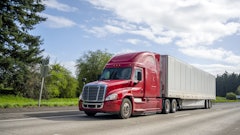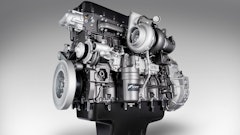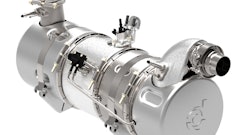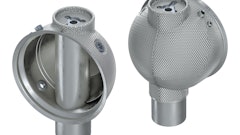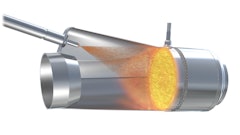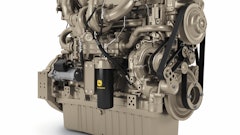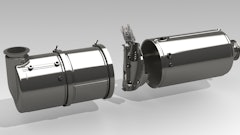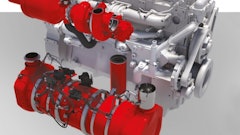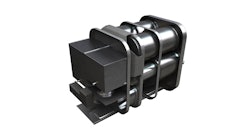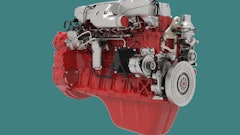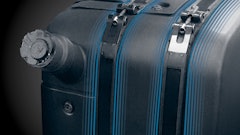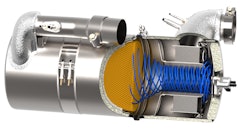Biodiesel's prospects surged forward this spring with several significant announcements endorsing the alternative fuel made from crops.
In May, New Holland became the first farm equipment manufacturer to embrace B20 (a diesel fuel containing 20% biodiesel) in all of the engines it manufactures. New Holland's announcement followed a similar announcement by DaimlerChrysler, which said it would warranty the use of B20 blends in its 2007 Dodge Ram pickup trucks sold to government, military and commercial fleets. And, San Francisco became the first major city to implement an aggressive biodiesel plan that mandates all city departments begin using a B20 blend as soon as possible with all city vehicles using the blend by the end of next year.
The announcements are significant because they signal rapidly growing acceptance of a blend that contains four times the 5% blend now endorsed by most engine and equipment manufacturers.
"Daimler and New Holland are on the leading edge of where the industry is going," says Brendan Prebo, a spokesperson for the National Biodiesel Board (NBB). "Are they on their own? No, not in the sense that other OEMs are closely watching them."
The announcements follow years of research and testing by the NBB and diesel engine, fuel injection and equipment manufacturers. That research is now focused on the next generation of on-highway diesel engines slated for 2007. "Our industry's goal is for B20 approval in all major diesel engines and vehicles and we are making great strides towards that," says Joe Jobe, NBB's CEO.
Joe Suchecki, spokesperson for the Engine Manufacturers Assoc. (EMA), agrees. "There is considerable interest in the use of biodiesel above 5%," he says.
A decision a long time in coming
New Holland's decision to embrace B20 has been a long time coming and the decision itself was kind of anticlimatic. "It wasn't a thunderstorm with lightning and thunder kind of thing," says Gene Hemphill, manager of North American Industry Affairs for New Holland. "It was more like a general rain that kept getting stronger and stronger."
New Holland's support of biodiesel started some 15 years ago at the World Pork Expo in Des Moines when it promoted its tractors as biodiesel fueled. That generated considerable interest in both the fuel and New Holland, Hemphill says. In the late 1990s, the company promoted biodiesel at Earth Days in Washington D.C., and four years ago became the first farm equipment company to join NBB's Biodiesel Alliance, a national coalition of organizations, agencies and businesses that promote the use of biodiesel fuel.
Hemphill says New Holland's May announcement was more of a formality, a formality intended to give biodiesel a boost. "We have always been confident about biodiesel internally," he says. "It just reached a point where it was time to make a statement."
The strategy has worked. Hemphill says the announcement has generated considerable interest both here and abroad. He was slated to fly to Canada in late June to discuss new government initiatives there.
Rebounding from last winter's woes
It represents quite a turnaround for biodiesel, which was under a cloud of concern just six months ago. That's when Minnesota was forced to suspend its mandated use of 2% biodiesel after clogged fuel filters stalled trucks, tractors and school buses throughout the state. The problem created a transportation crisis that caught everyone off guard, even though it's well known that biodiesel blends are more prone to cold-flow problems than standard diesel fuels.
"We were very surprised the problem occurred at the B2 level, which did send up some caution flags," Suchecki says.
A state investigation subsequently attributed the problem to quality control failures in the production process and determined it was not an inherent problem with the fuel itself.
"We are comfortable that it was basically a specification glitch coupled with less than adequate quality control going on with the opening of all the new biodiesel plants," says John Hausladen, president of the Minnesota Trucking Assoc. "It appears the plants had so much demand they did not do adequate on-site testing. Since then they have improved their quality testing protocols, added on-site storage tanks and implemented new filterablity tests that better mimic what happens in field conditions."
A push for nationwide B20 standard
One concern raised by the Minnesota fiasco was the need for a nationwide standard for blended biodiesel fuel. There is a standard for 100% biodiesel (ASTM D 6751), but nothing for the various blends that exist. "Diesel fuel has its own characteristics and biodiesel fuel has its own characteristics and they each bring their characteristics to the final blend," Prebo says.
Prebo says a nationwide standard for B20 would do a lot to gain acceptance for the fuel, although he concedes the lengthy drafting and approval process means a standard would probably not be in place until sometime next summer. However, he says many manufacturers may not wait that long, especially if they know a standard is in the works.
"Some manufacturers are beginning to realize the market may not wait for testing," Prebo says. ‘There are more than 500 fleets already using B20, and many fleet managers say their next vehicle purchase will be from manufactures who approve B20."
Prebo notes that a recent survey of 60 fleet operators and managers indicated that 80% of the respondents had favorable impressions of biodiesel fuels. "Manufacturers want to be on the right side of the issue," he says.
Engine manufacturers are already out in the lead. In June, EMA announced a specification for B20 test fuel that will give manufacturers a consistent and reliable blend that they can use to test their engines.
"The development of a test specification for a blended fuel with 20% biodiesel content is intended to jump-start the testing and evaluation process," says Jed Mandel, EMA's president. "We are hopeful that the additional research and evaluation of biodiesel fuels that meet the EMA B20 test specifications will speed the development of a national biodiesel blend fuel standard which assures satisfactory performance in all diesel engines."
In addition, the biodiesel industry has developed a BQ-9000 accreditation program for biodiesel producers and marketers. It doesn't vouch for the blended fuel itself, but certifies that the BQ-9000 recipient follows strict process and quality control standards.
The most popular alternative fuel
Biodiesel is popular for a variety of reasons. It reduces emissions of unburned hydrocarbons, carbon monoxide and particulate matter, and virtually eliminates sulfur oxides and sulfates, the major components of acid rain without significantly impacting fuel consumption, horsepower, torque and haulage rates.
Biodiesel also reduces the nation's dependence on foreign oil and helps agricultural communities by providing a huge new market for their crops.
"There is a business case for biodiesel," Prebo says. "Tax credits can make it less expensive than regular diesel."
Biodiesel is arguably the most popular of alternative fuels. It does not require any modifications to existing equipment and engines and has the most favorable energy balance. For every unit of fossil fuel consumed in the production process, 3.2 units of energy are gained, three times more than ethanol.
Biodiesel also benefits from being the new kid on the block. "The ethanol story has been around for 20 years," New Holland's Hemphill says. "Biodiesel, although it has been used for years, is considered new."
Biodiesel's production surged in 2005 and refineries are ramping up their capacity to meet additional demand this year. Currently, there are 65 biodiesel plants in the nation with a combined production capacity of 395 million gallons per year. Expansions at eight of those plants, plus the planned opening of 50 more facilities within the next 18 months will add another 713.7 million gallons of biodiesel product, according to the National Biodiesel Board.
There are still some questions surrounding biodiesel, especially in blends above B20, and manufacturers will be devoting a lot of energy toward educating end-users in the proper use of the fuel. For example, end-users need to check fuel filters more frequently after converting to biodiesel because the fuel's superior solvent qualities can dislodge sediment that has accumulated at the bottom of the fuel tank. They also need to be aware that biodiesel blends, especially those above B20, can increase the temperature at which diesel fuel gels.
It's unlikely that the industry will be in a hurry to move beyond a B20 standard.
"Right now we are focusing on getting to the B20 level," Prebo says. "We need a single standard rather than a variety of blends — now you have B2, B5, B11 and some doing B30 or B40."
Hemphill believes that given its ability to reduce emissions, decrease our dependence on foreign oil and increase crop prices, biodiesel is something the whole country can rally around.
"In a time when there are so many political differences, biodiesel is something that people can grab a hold of to help our energy situation," he says. "It is something they can understand and latch on to."
Dave Jensen is a contributing editor based in Milwaukee, WI.





